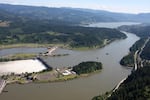
The Bonneville Dam on the Columbia River east of Portland. Washington and Oregon produce more than one-third of the nation’s hydropower.
Amelia Templeton / OPB
Hydropower generated for electricity from Oregon and Washington dams fell to historically low levels last year, and experts expect it could drop further by year’s end.
Officials at the U.S. Energy Information Administration recently published data showing that hydropower generation in the Northwest between Oct. 1, 2022 and Sept. 30, 2023 dropped to a 22-year low.
Eleven Western states produce up to 60% of the country’s hydroelectricity. Washington, California and Oregon are the three largest contributors, with Oregon and Washington producing more than one-third of all U.S. hydropower.
Both Oregon and Washington generated 20% less hydropower in 2023 than in 2021. The agency attributed this to low precipitation in the fall and winter, and the May 2023 “heat dome” that drove regional temperatures up 30 degrees Fahrenheit above average and rapidly melted snowpack in the region, which traditionally feeds rivers and streams steadily throughout the summer.
More frequent periods of drought, high temperatures and heavy rains could further influence hydropower production in the future. Officials at the Bonneville Power Administration, a federal agency in charge of marketing and coordinating all federally owned dams in the Northwest, said they’ve begun taking recent climatic changes into account when they budget for annual energy availability.
“Historically, we had drawn upon a 90-year data set that stretched back to 1929. We moved to using the latest 30-years of available data in order to capture the variability we were seeing,” said Kevin Wingert, a communications officer for the agency. “Patterns and trends that we witnessed in the 1930s and 1940s were becoming increasingly irrelevant to our modern experience.”
There are 150 hydropower dams in the Columbia River Basin, spanning parts of Canada, Montana, Idaho, Oregon and Washington. There are 18 hydroelectric dams on the main stem of the Columbia River and the Snake River, the main tributary to the Columbia River. These dams provide electricity to 60% of people in the Northwest and account for 90% of renewable energy generation in the region, according to the Bonneville Power Administration.
Across the West, hydropower generation in 2022 and 2023 was down 11% from 2021, according to the data. California was an outlier, doubling the amount of hydropower generated due to record rainfall and snowpack. Experts at the federal agency predict that hydropower generation across the West for 2024 will decrease 12% from 2023, leading to more historic lows.
These drops in power production come during a period of historically high electricity demand that is expected to grow as transportation, manufacturing and home energy move away from fossil fuels and increasingly become electrified. It’s also expected to increase as more data centers are built in the Northwest in and around the Columbia River Basin. The Bonneville Power Administration expects data centers to more than double their electricity demand in Oregon and Washington during the next two decades. The industry trade group Pacific Northwest Utilities Conference Committee projects demand for electricity in the region will rise 25% within the next decade.
Oregon Capital Chronicle is part of States Newsroom, a network of news bureaus supported by grants and a coalition of donors as a 501(c)(3) public charity. Oregon Capital Chronicle maintains editorial independence. Contact Editor Lynne Terry for questions: info@oregoncapitalchronicle.com. Follow Oregon Capital Chronicle on Facebook and X.